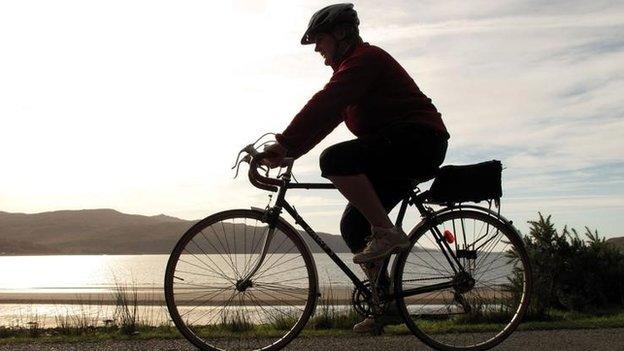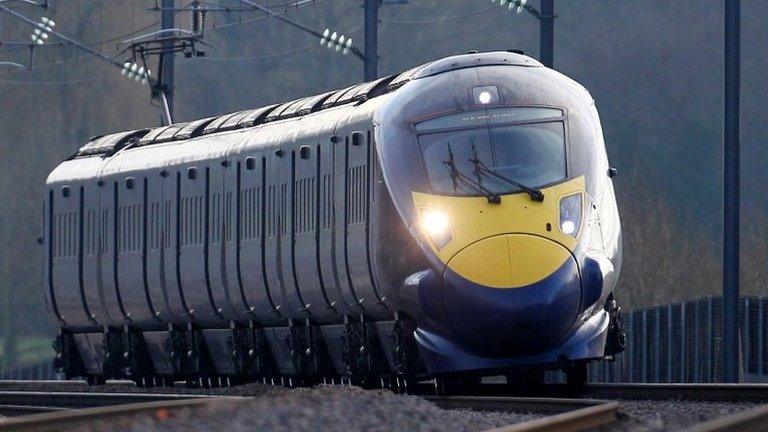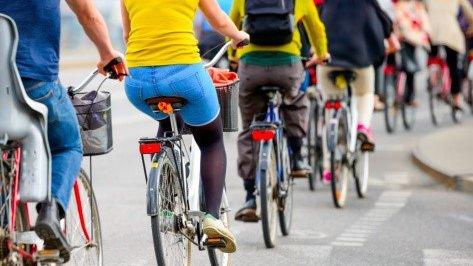UK firms urge more cash and leadership on cycling
- Published

There is huge "latent demand" for cycling going untapped, the firms say
Leading British firms are urging politicians to set aside more money to encourage cycling, saying existing support is "short-term and irregular".
Santander, Sky, National Grid and GlaxoSmithKline are among those calling for new targets, such as ensuring 10% of all journeys are by bike by 2025.
It wants 5% of annual transport spend to go to cycling, focused on more cycle-friendly roads and junctions.
The government announced £214m in additional funding last year.
Members of the Choose Cycling Network have written an open letter to David Cameron, Ed Miliband, Nick Clegg and other party leaders calling for more emphasis on cycling in future transport and infrastructure investments.
Speaking last July, deputy prime minister Nick Clegg said he wanted the number of journeys taken by bike to double by 2020.
But the network - whose other members include Orange, British Land and Halfords - says "more meaningful targets" are needed, including a goal of seeing cycling account for one in ten of all trips by 2025.
'Latent demand'
To do this, it says 5% of the government's annual expenditure on transport should be "ring-fenced" for cycling, up from the 1% it says is allocated at the moment.
Funding for cycling is "short-term and irregular", says the letter - signed by the bosses of more than 20 leading organisations - with many sources of support due to end in 2016.
Cycling, it says, has clear benefits for productivity, public health, employee morale and the environment and needs to be put "at the heart of transport policy".
But the "latent demand" for cycling is going unmet, it says, due largely to a shortage of segregated cycle lanes and a lack of other cycle-friendly infrastructure.
"This is not about cycling, it is about logical, sustainable, every-day transport solutions that are good for us all," the letter states.
"The number of trips currently made by bicycle in England is around 1%. This figure has declined massively since the 1950s due to the huge rise in motor traffic and demonstrates that - if we - if we want to change the way we live - we need to design cycling back into our road network."
'Solid commitments'
British Cycling, the governing body for cycling, said "solid commitments" on cycling were needed in the parties' manifestos as the "issue was not going to go away".
"David Cameron, Ed Miliband and the other party leaders musty demonstrate that they are taking cycling seriously as a legitimate tool to transform Britain's towns and cities for the better," said its policy adviser, former top cyclist Chris Boardman.
The letter was published on the day ministers announced plans to improve road and rail links across the north of England over the next decade.
The government says it has invested nearly £600m in cycling since 2010.
Among recent commitments, cities that are part of the cycling ambition programme, including Bristol, Birmingham, Cambridge, Norwich and Oxford, are to share £114m to accelerate their development of local cycling networks, increase protection for cyclists at junctions and traffic hot spots and help prevent accidents.
About £100m is also being spent to improve the conditions for cyclists and walkers travelling alongside and crossing Britain's most important and busiest roads.
- Published20 March 2015

- Attribution
- Published25 July 2019

- Published16 October 2014
